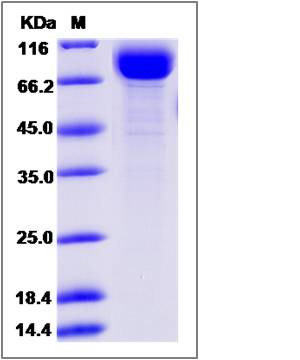Cynomolgus IL18R1 Protein (Fc Tag)
IL18R1
- 100ug (NPP4431) Please inquiry
| Catalog Number | P90121-C02H |
|---|---|
| Organism Species | Cynomolgus |
| Host | Human Cells |
| Synonyms | IL18R1 |
| Molecular Weight | The recombinant cynomolgus IL18R1 comprises 538 amino acids and has a calculated molecular mass of 61.1 KDa.The apparent molecular mass of the protein is approximately 70-92 KDa in SDS-PAGE. |
| predicted N | Ala 19 |
| SDS-PAGE |  |
| Purity | > 95 % as determined by SDS-PAGE |
| Protein Construction | A DNA sequence encoding the cynomolgus IL18R1 (F7H8F9) (Met1-Lys315) was expressed with the Fc region of human IgG1 at the C-terminus. |
| Bio-activity | |
| Research Area | Cancer |Invasion microenvironment |Angiogenesis |Cytokine & Receptor |Interleukin & Receptor |IL-1 family & Receptor | |
| Formulation | Lyophilized from sterile PBS, pH 7.4. 1. Normally 5 % - 8 % trehalose, mannitol and 0.01% Tween80 are added as protectants before lyophilization. Specific concentrations are included in the hardcopy of COA. |
| Background | Interleukin-18 receptor 1 (IL18R1) also known as CD218 antigen-like family member A, CDw218a, IL1 receptor-related protein and CD218a, is an interleukin receptor of the immunoglobulin superfamily. IL18R1 is found expressed in lung, leukocytes, spleen, liver, thymus, prostate, small intestine, colon, placenta, and heart, and is absent from brain, skeletal muscle, pancreas, and kidney. High level of expression is found in Hodgkin disease cell lines. This receptor is specifically binds interleukin 18 (IL18), and is essential for IL18 mediated signal transduction. IL18R1 contains 3 Ig-like C2-type (immunoglobulin-like) domains and 1 TIR domain. It is a single-pass type I membrane protein. IFN-alpha and IL12 are reported to induce the expression of this receptor in NK and T cells. The increased expression of IL18R1 may contribute pathogenically to disease and is therefore a potential therapeutic target. The absence of a genetic association in the IL18R1 gene itself suggests regulation from other parts of the genome, or as part of the inflammatory cascade in multiple sclerosis without a prime genetic cause. |
| Reference |
